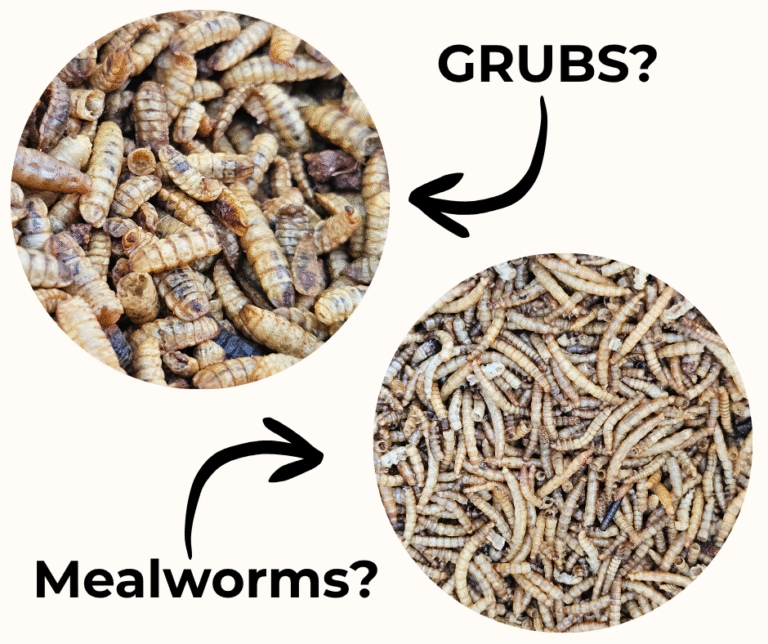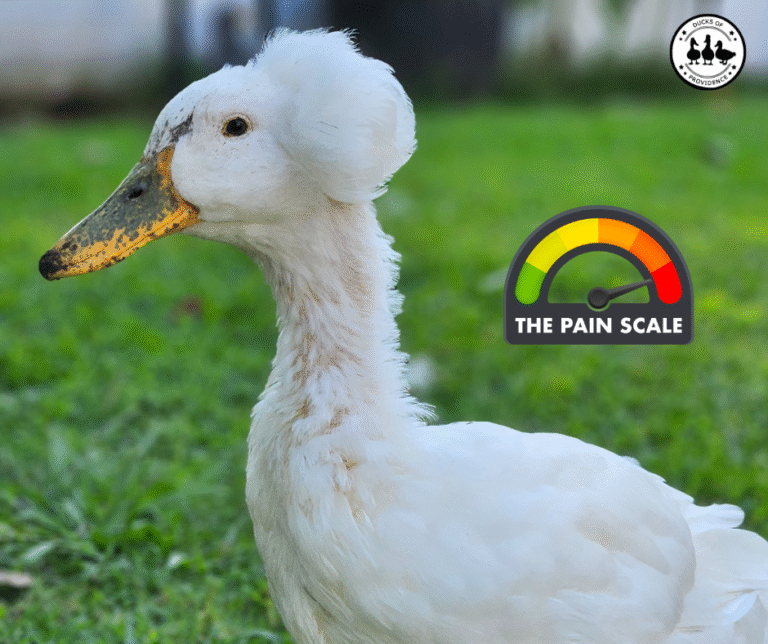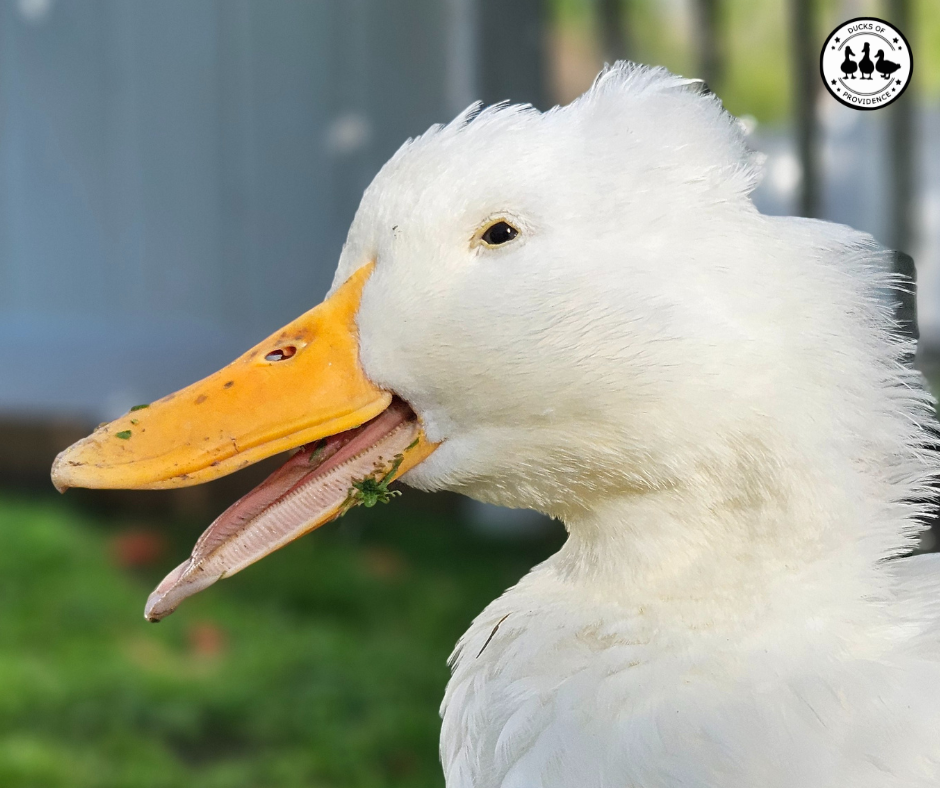
Duck Coughing: Causes, Symptoms, and Solutions
Last updated on April 7th, 2025 at 07:51 pm
Ducks are generally hardy creatures that thrive in a range of environments, but like all animals, they can face health challenges. If you’ve noticed your duck coughing, sneezing, or making unusual respiratory sounds, it’s crucial to pay attention. Respiratory issues in ducks can escalate quickly if left untreated, so understanding the root causes and knowing how to respond can make all the difference. In this guide, we’ll explore why ducks might cough, common symptoms to look out for, and effective treatment options to keep your flock healthy and quackin’!
Disclaimer: I may earn a commission if you purchase products or services Ducks of Providence is free, thanks to reader support! Ads and affiliate links help us cover costs—if you shop through our links, we may earn a small commission at no extra cost to you. Thanks for helping keep our content free and our ducks happy! 🦆 Learn more
Can Ducks Really Cough?
Yes, ducks can cough, although it may not sound quite like a human cough. Ducks don’t have vocal cords, so their coughing manifests as raspy or wheezing sounds rather than a sharp bark. A duck’s cough can be triggered by irritation in its airways or as a response to blockages, infections, or irritants. Understanding these sounds can help you differentiate between normal duck noises and something that might require your attention.

When to Be Concerned
- Occasional coughing or sneezing can happen, especially if ducks are exposed to dusty bedding or sudden changes in temperature.
- However, persistent coughing, open-mouth breathing, or signs of distress indicate a more serious issue and should prompt further investigation.
Common Causes of Coughing in Ducks
Coughing in ducks can be triggered by a wide range of factors, from infections to environmental irritants. Identifying the specific cause is crucial for effective treatment and prevention. Here’s an in-depth look at the most common culprits:
A. Respiratory Infections and Pneumonia
Pneumonia is a serious condition caused by bacterial, fungal, parasitic, or viral infections that attack your duck’s respiratory system, leading to fluid buildup in their lungs. This can severely impact their ability to breathe and, if left untreated, can be life-threatening.
Common symptoms of pneumonia in ducks include:
- Difficulty breathing or labored breaths
- Wheezing or gurgling sounds
- Persistent coughing or sneezing
- Nasal discharge
- Open-bill panting and abdominal heaving
- Lethargy, fever, and loss of appetite
If your duck shows any of these signs, it’s crucial to seek veterinary care immediately. A vet will likely listen to your duck’s lungs (and air sacs), take their temperature, and recommend an X-ray to confirm the diagnosis.
Treatment for pneumonia usually involves prompt antibiotic therapy. Vets often administer an injectable antibiotic (like Baytril®) initially to kickstart treatment, followed by a course of oral antibiotics for 10-14 days. During recovery, it’s important to keep your duck in a stable environment, free from extreme temperatures, to minimize stress and aid their healing.
Bacterial Infections
- Symptoms: Coughing, sneezing, nasal discharge, lethargy, reduced appetite.
- Common Culprits: Pasteurella multocida (the bacteria behind fowl cholera) and Mycoplasma anseris. These pathogens can infect ducks, especially when they are stressed or their immune systems are compromised.
- Transmission: Bacterial infections spread through contaminated water, bedding, or contact with wild birds. Ducks kept in overcrowded or unsanitary conditions are particularly vulnerable.
- Treatment: Infected ducks may require antibiotics prescribed by a veterinarian. Early intervention is key to preventing severe complications.
Viral Infections
- Symptoms: Coughing, wheezing, swollen eyes, labored breathing, and sometimes sudden death.
- Common Viruses:
- Duck Viral Enteritis (also known as duck plague): Causes respiratory distress along with other systemic symptoms.
- Avian Influenza (Bird Flu): Highly contagious, causing severe respiratory symptoms and even death in severe cases.
- Transmission: Wild birds are a major source of viral infections, so maintaining biosecurity is crucial.
- Treatment: Unfortunately, there is no direct treatment for viral infections in ducks. Supportive care, isolation, and biosecurity measures are the best strategies.
Fungal Infections (Aspergillosis)
- Symptoms: Coughing, gasping, open-mouth breathing, and lethargy.
- Cause: Caused by inhaling mold spores, particularly from wet, moldy bedding, feed, or poor ventilation. Aspergillosis is more common in damp, enclosed environments where mold can thrive.
- Treatment: Antifungal medications are needed, and infected birds should be isolated. Prevention includes ensuring dry bedding, proper ventilation, and regular coop cleaning.
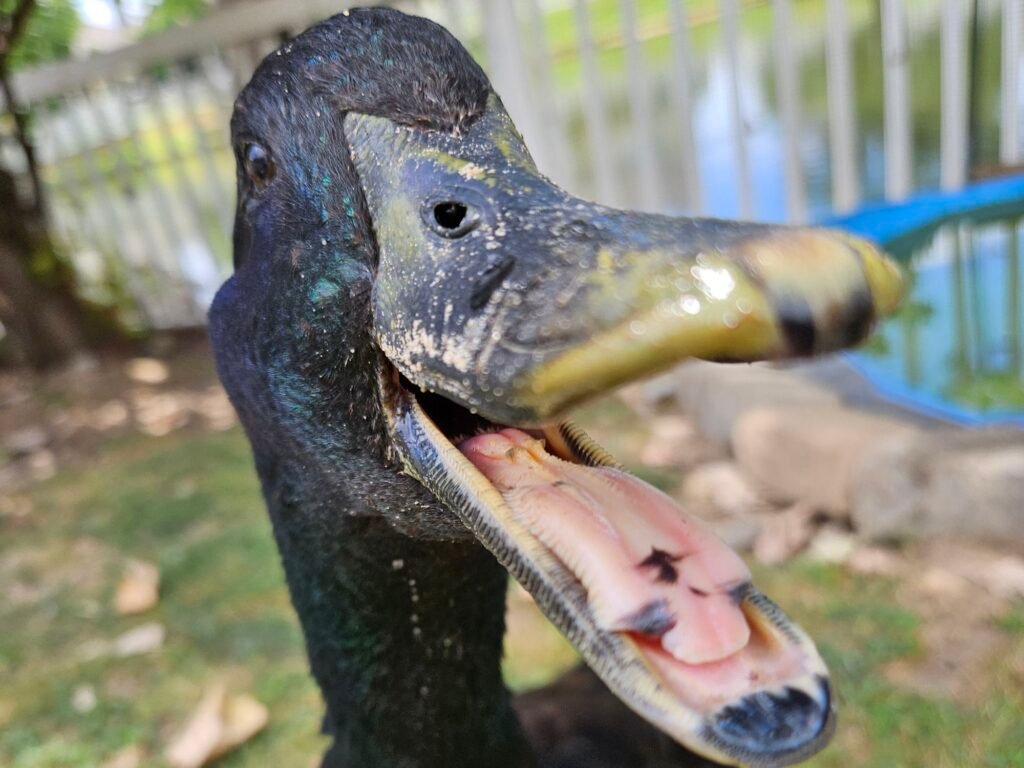
B. Foreign Objects or Debris
Ducks are naturally curious and will nibble on almost anything they come across, which can sometimes lead to respiratory issues.
Aspiration Pneumonia
Aspiration pneumonia is a type of pneumonia that occurs when a duck accidentally inhales liquids, food, blood, or vomit into their trachea and lungs. This can happen if they choke while eating or drinking, especially if they gulp too quickly.
Symptoms of aspiration pneumonia to watch for include:
- Gurgling or wet-sounding breaths
- Coughing and difficulty swallowing
- Hoarse quacking or vocal changes
- Shortness of breath, panting, or labored breathing
- Fever, particularly if an infection develops
In minor cases, your duck may clear a small amount of aspirated water on their own. However, if symptoms persist for more than two hours or worsen, it’s time to contact your vet. In severe cases where food, blood, or vomit is inhaled, the situation can be dire, so don’t delay seeking veterinary assistance.
A vet can diagnose aspiration pneumonia by listening to the duck’s lungs and possibly using an X-ray. Treatment often involves antibiotics (such as injectable Baytril®) to prevent infections, reduce the risk of lung abscesses, and stop tissue damage. In severe cases, your duck may need supplemental oxygen to support their breathing.
Dust and Bedding
- Symptoms: Coughing, sneezing, and irritation of the eyes or nostrils.
- Cause: Dusty bedding (like straw or hay) or dry feed can irritate a duck’s airways, especially in poorly ventilated spaces. Ducks may inhale these fine particles, causing temporary coughing fits.
- Prevention: Use low-dust bedding materials such as pine shavings or straw that has been properly shaken out. Regularly change bedding and avoid allowing dust to accumulate in enclosed spaces.
Accidental Inhalation
- Symptoms: Sudden coughing fits, neck stretching, or gagging movements.
- Cause: Ducks may accidentally inhale small particles of food, grit, or dirt while foraging. Inhalation of water droplets while drinking or dunking can also cause them to cough briefly.
- Prevention: Ensure feeding areas are kept clean and avoid feeding very fine, powdery feed. Providing shallow water dishes can help minimize the risk.
C. Parasites (Gapeworms)
Parasites can be a sneaky but serious cause of respiratory distress in ducks, especially for those with access to outdoor environments.
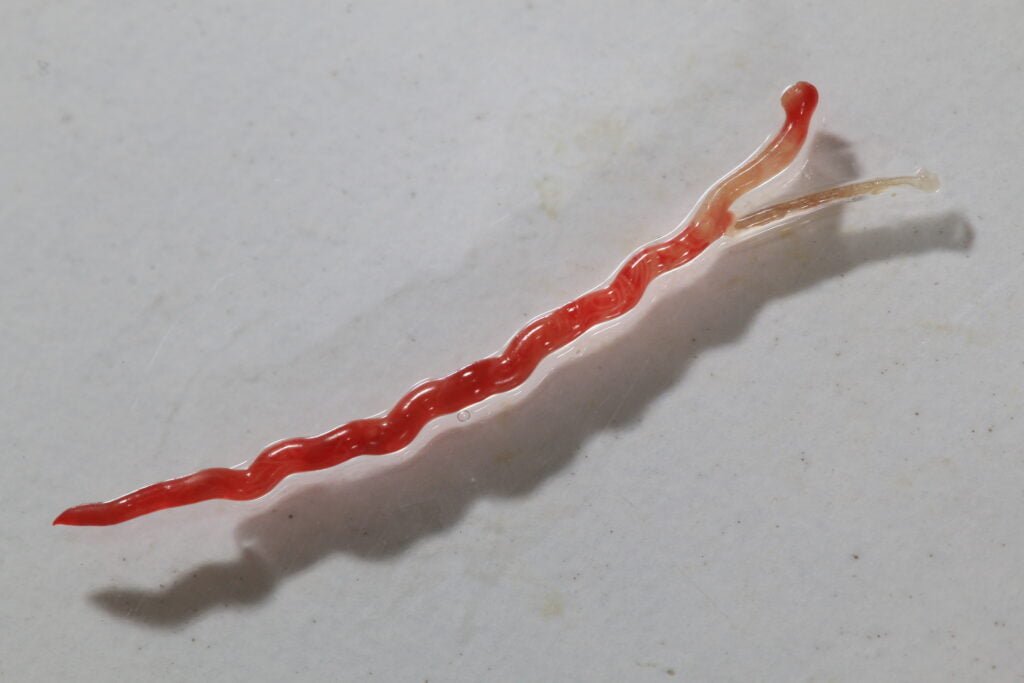
Gapeworm Infestations
- Symptoms: Persistent coughing, gaping (stretching the neck and opening the mouth wide), wheezing, and labored breathing.
- Cause: Gapeworms (Syngamus trachea) are parasitic worms that attach to the lining of the trachea, causing obstruction and irritation. Ducks can contract these worms from ingesting intermediate hosts like earthworms, snails, or slugs, or by foraging in contaminated areas.
- Transmission: Gapeworm eggs can survive in soil for years, so even brief exposure to contaminated areas can lead to infection.
- Treatment: Dewormers like fenbendazole can be effective, but treatment should be overseen by a vet. Regular fecal testing can help detect infestations early.
Other Internal Parasites
- Symptoms: Mild coughing, weight loss, and reduced egg production.
- Cause: While gapeworms are the most notorious for causing respiratory symptoms, other parasites like roundworms and tapeworms can also impact a duck’s health indirectly, leading to overall stress and susceptibility to infections.
➡️ Learn more about internal parasites like the gapeworm.
D. Poor Ventilation and Ammonia Build-Up
Air quality inside your duck coop is crucial for their respiratory health.
Ammonia Buildup
- Symptoms: Coughing, watery eyes, and nasal discharge.
- Cause: Duck waste is high in nitrogen, which can break down into ammonia if bedding isn’t changed frequently. Ammonia is a potent irritant and can damage the sensitive lining of a duck’s respiratory tract.
- Prevention: Ensure good airflow in the coop by using vents or fans. Regularly clean out wet bedding and use absorbent materials to reduce moisture. Deep cleaning every few weeks can help prevent ammonia accumulation.
Temperature and Humidity Fluctuations
- Symptoms: Coughing, lethargy, and susceptibility to infections.
- Cause: Ducks are hardy but sudden drops in temperature or high humidity can stress their respiratory systems. Poor ventilation can also trap moisture, leading to mold growth, which increases the risk of fungal infections.
- Prevention: Avoid drastic changes in coop temperature. Use fans or dehumidifiers if needed, especially in wet climates.
E. Environmental Toxins and Pollutants
Sometimes, the environment outside your control can negatively impact your ducks’ respiratory health.
Smoke and Chemicals
- Symptoms: Persistent coughing, labored breathing, lethargy.
- Cause: Exposure to smoke from wildfires, pesticides, or other airborne chemicals can irritate a duck’s sensitive lungs.
- Prevention: If smoke or pollutants are present in the area, try to keep your ducks indoors with good ventilation. Avoid using harsh chemicals around their living area.
Mold and Mildew
- Symptoms: Chronic coughing, sneezing, and nasal discharge.
- Cause: Mold spores thrive in damp environments, and prolonged exposure can lead to respiratory problems. Even a damp feed bag or improperly stored bedding can introduce mold.
- Prevention: Store feed and bedding in dry, sealed containers. Regularly inspect the coop for signs of mold, especially in hidden corners.
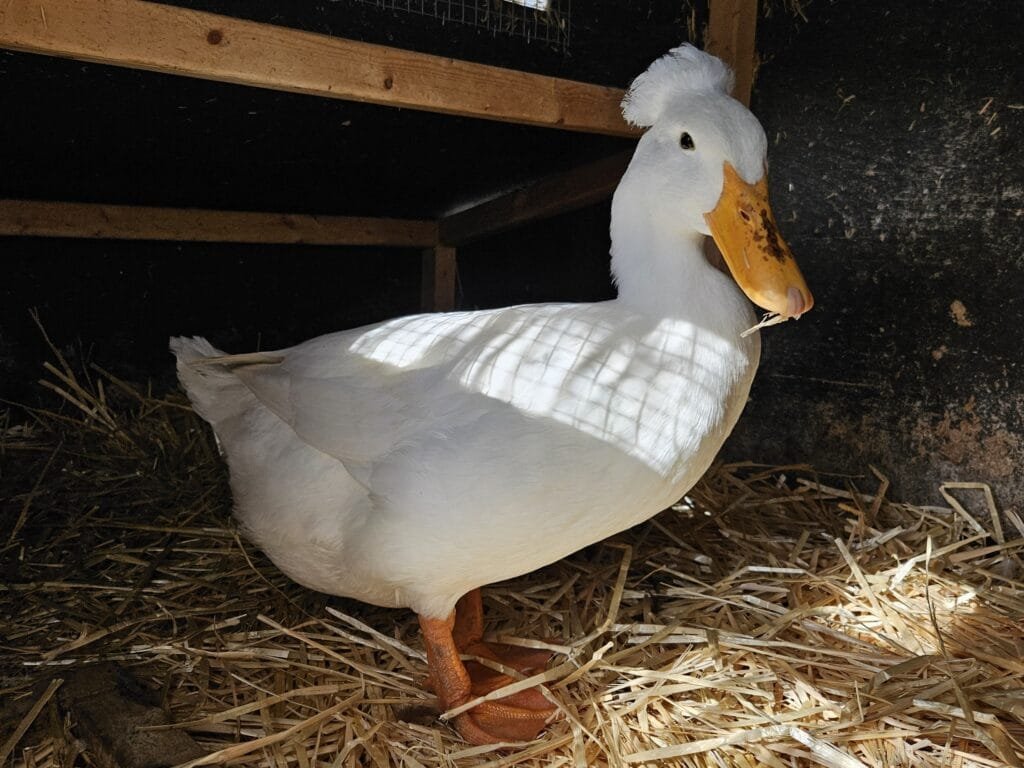
F. Air Sac Injury & Infection
In addition to lungs, ducks have a complex system of air sacs spread throughout their bodies. These air sacs play a crucial role in their unique respiratory process, which requires two full breaths to move air completely in and out. However, injuries to these air sacs can have significant effects on your duck’s health and even alter their buoyancy in water.
Symptoms of an infected air sac include:
- Difficulty breathing and wheezing
- Persistent coughing
- Excessive panting with an open bill
- Abdominal heaving
If an air sac is ruptured, your duck may float unbalanced in water. In cases where the injury becomes infected, the symptoms listed above may also appear.
Diagnosis and Treatment: Your vet will examine your duck by listening to their lungs and air sacs and may use an X-ray for confirmation. If a punctured air sac is detected, there’s often little that can be done beyond prescribing antibiotics to prevent infection as the air sac heals on its own.
Interestingly, 90% of air sac injuries in adult ducks resolve naturally, especially with antibiotic support to avoid infections. Even if a collapsed air sac doesn’t fully reinflate, your duck can often return to normal life. As long as there’s no difficulty breathing, further intervention isn’t necessary—though your duck may float a bit crooked.
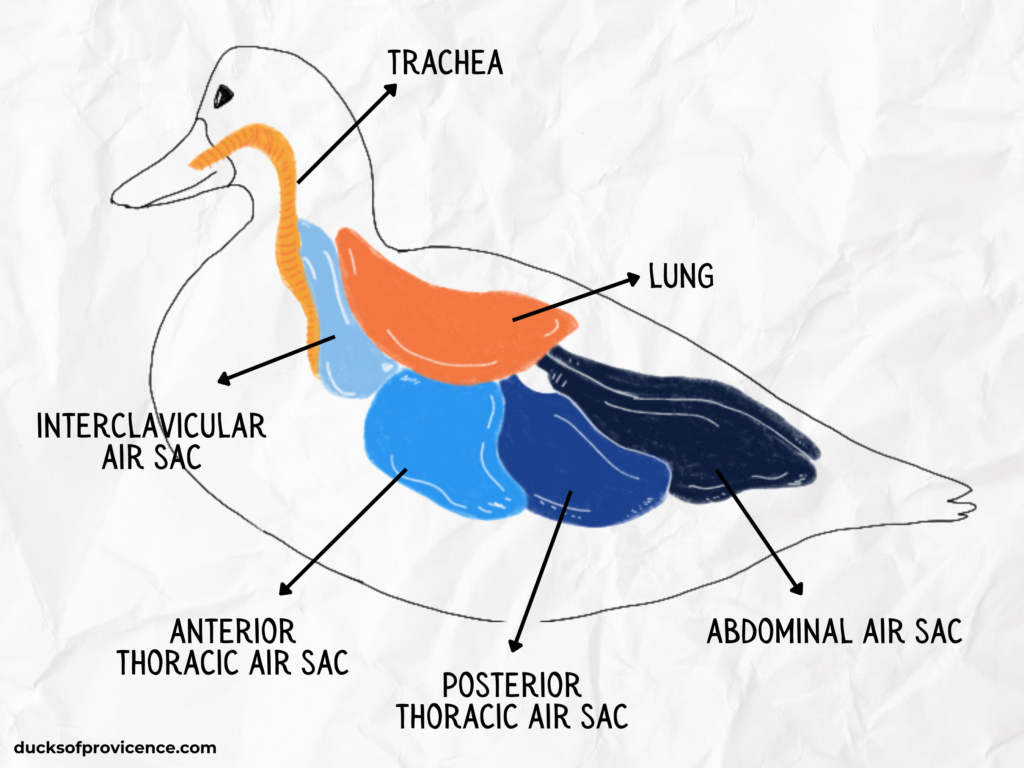
However, in approximately 10% of cases, more severe injuries may require additional treatment. Younger ducks, in particular, may struggle to recover fully. In these tougher scenarios, vets might need to insert a catheter to assist with healing. This catheter is often sutured in place to help stabilize the air sac during recovery.
➡️ Learn more about the respiratory system of ducks.
Recognizing Symptoms of Coughing in Ducks
Ducks are hardy birds, but they can be quite good at hiding symptoms of illness. This natural tendency to mask symptoms can make it challenging to identify health problems early on. However, paying close attention to even subtle changes in your duck’s behavior and physical appearance can be crucial. Let’s explore the various symptoms that might accompany coughing in ducks, so you can act promptly to address any health issues.
Persistent Coughing or Gagging
- What It Looks Like: Repeated coughing fits or a sound similar to quacking, but with a raspy or “choked” tone. Ducks may also stretch their necks forward while coughing, which looks like they are trying to dislodge something from their throat.
- What It Indicates: Persistent coughing is often a sign of a respiratory infection, such as bacterial or viral illnesses, or it could suggest irritation due to foreign objects, dust, or even gapeworms obstructing the airways.
Labored or Noisy Breathing
- What It Looks Like: You might hear wheezing, rattling, or a whistling sound when your duck breathes. Some ducks may open their beaks wide to breathe or appear to struggle for air, especially after exertion.
- What It Indicates: Labored breathing is a classic symptom of respiratory distress, often associated with infections like aspergillosis or the presence of parasites like gapeworms. It can also signal ammonia buildup in poorly ventilated coops.
Nasal Discharge
- What It Looks Like: Clear, cloudy, or thick mucus discharge from one or both nostrils. The area around the nares (nostrils) may appear wet or crusted over.
- What It Indicates: Nasal discharge is often linked to bacterial infections, such as Mycoplasma or Pasteurella, or can result from exposure to irritants like dust or ammonia. In severe cases, it may indicate viral infections like avian influenza.
Sneezing and Sniffling
- What It Looks Like: Frequent sneezing accompanied by head shaking. Ducks may wipe their beaks on the ground or their feathers in an attempt to clear their nasal passages.
- What It Indicates: Sneezing can be a sign of an upper respiratory infection, allergic reactions, or irritation from dust, mold, or chemical exposure. It can also result from inhaling water while dunking or foraging in muddy areas.
Lethargy and Decreased Activity
- What It Looks Like: Ducks that are usually active and curious may become listless, sit quietly with their eyes closed, or appear disinterested in their surroundings.
- What It Indicates: Lethargy is a non-specific but concerning symptom that suggests a more severe underlying condition, such as a systemic infection, advanced parasitic infestation, or exposure to toxins. It often accompanies other symptoms like coughing or labored breathing.
Reduced Appetite and Weight Loss
- What It Looks Like: Ducks may show a lack of interest in their favorite treats or foraging activities. Over time, you might notice weight loss, a prominent keel bone, or a drooping posture.
- What It Indicates: When ducks are struggling to breathe, they may eat less due to discomfort. Chronic infections or parasitic infestations can also lead to reduced nutrient absorption, causing weight loss. Weight loss is especially concerning if accompanied by coughing and lethargy.
Swollen Eyes or Sinus Infections
- What It Looks Like: Puffy or swollen areas around the eyes, sometimes with discharge that causes the eyelids to stick together. Ducks may rub their eyes on the ground or feathers to relieve discomfort.
- What It Indicates: Swollen eyes are commonly associated with sinus infections, which can occur due to bacterial or fungal infections. This symptom often accompanies nasal discharge, coughing, and sneezing.

Gasping or Open-Mouth Breathing
- What It Looks Like: Ducks may tilt their heads back, stretch their necks, and open their beaks wide as they struggle to draw in air. This can be mistaken for yawning but is usually more frantic.
- What It Indicates: Open-mouth breathing can be a sign of severe respiratory distress, often linked to gapeworm infestations, aspergillosis, or severe viral infections. It indicates an urgent need for veterinary attention.
Head Shaking and Neck Stretching
- What It Looks Like: Ducks might frequently shake their heads or stretch their necks as if trying to clear their throats.
- What It Indicates: This behavior can suggest irritation from dust, inhaled foreign objects, or even mild congestion from a respiratory infection. Neck stretching paired with coughing often indicates the presence of gapeworms or other airway blockages.
Cyanosis (Bluish Tint to Beak and Feet)
- What It Looks Like: The normally pink or yellow skin on a duck’s beak and feet may take on a bluish tint. The color change is more noticeable in light-colored ducks.
- What It Indicates: Cyanosis occurs when ducks are not getting enough oxygen, often due to severe respiratory distress. This is a critical symptom that requires immediate veterinary intervention, as it could indicate conditions like severe pneumonia or airway obstruction.
Red Flags: If you notice any combination of these symptoms, especially open-mouth breathing or neck stretching, it’s time to take immediate action.
When to Seek Veterinary Help
While some mild coughing can be temporary and related to harmless causes like dust or water ingestion, persistent or severe symptoms should not be ignored. If your duck shows any of the following signs, it’s time to consult a veterinarian:
- Continuous coughing or wheezing lasting more than a day.
- Labored breathing, especially if accompanied by open-mouth gasping.
- Significant lethargy, loss of appetite, or weight loss.
- Swollen eyes, nasal discharge, or signs of cyanosis.
- Symptoms that worsen despite improving environmental conditions.
How to Treat and Prevent Coughing in Ducks
If you notice your ducks coughing or showing other symptoms of respiratory distress, it’s important to act quickly. While some minor issues can be managed at home, more severe conditions require prompt veterinary care. Here’s an in-depth guide on how to treat a coughing duck and support its recovery.
Immediate At-Home Care for Mild Symptoms
For cases where coughing is mild and not accompanied by severe symptoms, some home remedies and supportive care can help your duck recover.
- Move Ducks to a Clean, Well-Ventilated Space
- Why It Helps: Fresh air and a clean environment can reduce exposure to potential irritants like dust, mold, and ammonia buildup, which can trigger or worsen coughing.
- How to Do It: Place your ducks in a covered, draft-free area with good ventilation. Clean the bedding and ensure the coop is dry and free from droppings. Using straw or pine shavings as bedding is preferable to hay, which can harbor mold.
- Provide Warmth and Hydration
- Why It Helps: Ducks dealing with respiratory stress may have a harder time regulating their body temperature. Keeping them warm and well-hydrated helps support their immune system.
- How to Do It: Use a heat lamp if needed (especially for ducklings or during cold weather) and ensure access to clean, lukewarm water. Adding electrolytes or vitamins like Hydro-hen, save-a-chick, or VitaMetz to their water can also boost their recovery.
- Steam Therapy
- Why It Helps: Inhaling steam can help loosen mucus in the airways, making it easier for ducks to breathe if they have congestion.
- How to Do It: Place your duck in a small bathroom, close the door, and run a hot shower for 10-15 minutes. Ensure the duck is not exposed to direct hot water but benefits from the steam-filled air. Repeat once a day if needed.
- Using VetRx for Mild Respiratory Issues
- If your duck is experiencing mild coughing or congestion, VetRx can be a great, natural remedy to provide some relief. Think of it as the “Vicks VapoRub” for ducks—it works by soothing their airways and helping them breathe easier. To use VetRx, rub a small amount on their bill and just under their feathers around the head and neck area. This allows your duck to inhale the vapors, which can help clear congestion.
- You can also add a few drops of VetRx to their drinking water (follow the dosage instructions on the bottle) for internal support. While this remedy won’t cure serious infections, it can be a helpful part of your at-home care for mild cases of coughing or nasal discharge.
- Supplements and Immune Boosters
- Why It Helps: Supplements can strengthen your duck’s immune system, helping them fight off infections.
- What to Use: Garlic-infused water (a natural antimicrobial) or apple cider vinegar (1 tablespoon per gallon of water) can support respiratory health. However, use these remedies cautiously, as too much can cause digestive upset.
Duck First Aid Kit
Whether you’re a seasoned duck keeper or just starting your quacking journey, having reliable first aid supplies on hand is essential. Don’t wait until an emergency strikes—be prepared and proactive in safeguarding the health of your feathered companions.

Treatment Options for Moderate to Severe Cases
If your duck’s symptoms are more severe, or if they persist beyond a day or two despite supportive care, it’s crucial to consult a veterinarian. Some conditions require specific medications and professional interventions.
- Antibiotics for Bacterial Infections
- When to Use: If a bacterial infection is suspected (e.g., Mycoplasma or Pasteurella), your vet may prescribe antibiotics like doxycycline or tylosin.
- How It Helps: Antibiotics target the bacteria causing the infection, reducing inflammation and allowing your duck’s respiratory system to recover. Note that improper or unnecessary use of antibiotics can lead to resistance, so always follow veterinary advice.
- Antifungal Medications for Aspergillosis
- When to Use: Fungal infections like aspergillosis are common in environments with moldy feed or bedding. If your vet diagnoses this condition, antifungal drugs like itraconazole may be prescribed.
- How It Helps: Antifungals work by inhibiting the growth of fungi in the respiratory tract, allowing your duck to breathe more easily. Treatment for fungal infections can take several weeks and may require adjustments in the duck’s living environment.
- Dewormers for Gapeworm Infestation
- When to Use: If gapeworms are causing your duck to cough, your vet may recommend a dewormer like fenbendazole or ivermectin.
- How It Helps: These medications kill parasitic worms, clearing the airways and alleviating symptoms. Gapeworm infestations often require several doses over a period of days, so follow the treatment schedule closely.
- Anti-Inflammatories and Supportive Therapies
- When to Use: In severe cases where there is significant swelling or discomfort, your vet may prescribe anti-inflammatory medications like meloxicam to reduce pain and inflammation.
- How It Helps: Reducing inflammation helps improve your duck’s breathing and overall comfort, especially if the coughing is caused by irritation or injury to the airways.
- Nebulization Therapy
- What It Involves: Nebulization involves delivering medication directly into the duck’s airways through a mist. This method is often used for severe respiratory infections.
- How to Do It: Your vet may provide specific medications for nebulizing, such as antibiotics or antifungals, diluted in saline. Nebulizers designed for pets can be used at home under veterinary guidance.
Creating a Sick Bay for Ducks
When one of our ducks isn’t feeling well, we set up a sick bay right in our living room. This allows us to keep a close eye on them during recovery, ensuring they get the care and attention they need. For this, we love using foldable playpens—they’re super convenient to assemble and provide a safe, enclosed area.
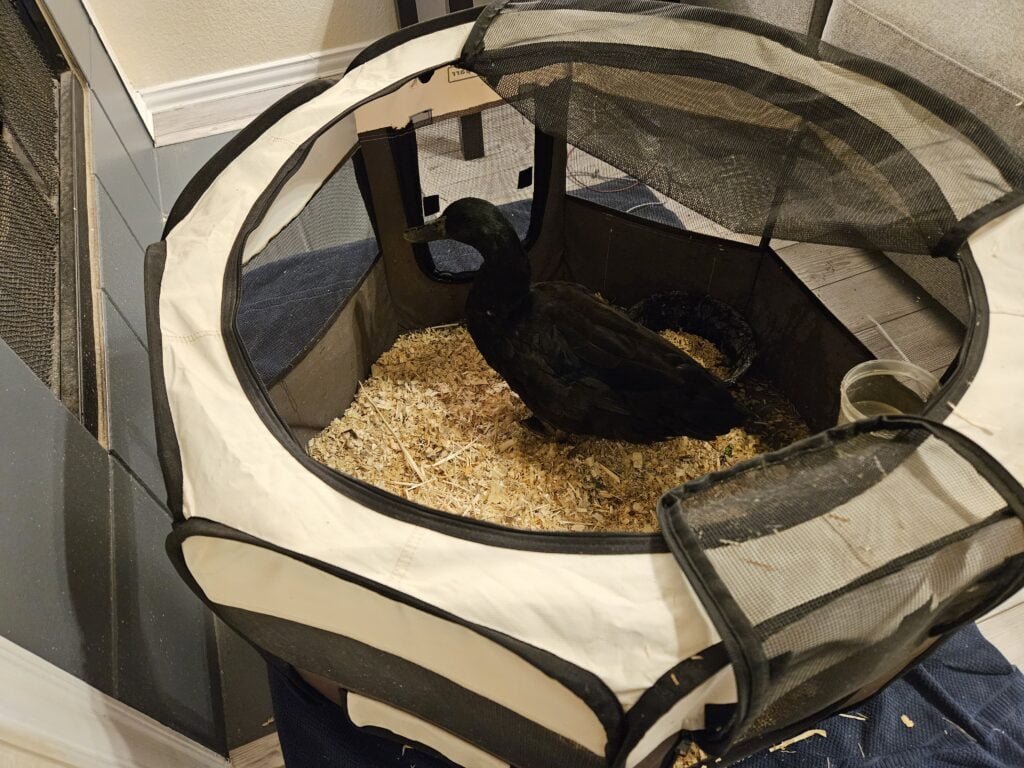
We line the playpen with soft bedding, add a shallow water dish, and place some food nearby. Having them close by not only makes it easier to monitor their condition but also helps them feel comforted and secure in a familiar environment. Plus, it’s heartwarming to be able to check on them as often as we like!
Long-Term Management and Recovery Support
Once your duck begins to show signs of improvement, continue supportive care to ensure full recovery.
- Probiotics and Digestive Support
- Why It Helps: Antibiotics can disrupt gut flora, so adding probiotics to your duck’s diet helps restore healthy gut bacteria, supporting overall immunity.
- How to Administer: Add probiotic supplements or plain yogurt to your duck’s feed for a week or so after antibiotic treatment. Other products, such as Hydro-Hen, have also added probiotics.
- Nutrient-Rich Diet
- Why It Helps: A balanced diet with plenty of greens, protein, and vitamins strengthens your duck’s immune system and aids in recovery.
- What to Feed: Consider adding foods high in Vitamin A, such as leafy greens and sweet potatoes, which are beneficial for respiratory health.
- Regular Health Monitoring
- Why It Helps: Ducks can relapse if underlying issues are not fully addressed. Keep an eye on their behavior, eating habits, and breathing for a few weeks after treatment.
- How to Do It: Conduct regular health checks, watching for any signs of coughing, lethargy, or labored breathing. Early intervention can prevent a minor issue from escalating.
When to Contact a Veterinarian Immediately
There are times when at-home care is simply not enough. Contact your vet immediately if:
- Your duck is gasping for air or breathing with its mouth open.
- There’s a bluish tint (cyanosis) on the beak or feet, indicating severe oxygen deprivation.
- Symptoms worsen rapidly, or your duck stops eating and drinking.
- The coughing is accompanied by significant weight loss, lethargy, or a complete lack of energy.
Home Remedies for Ducks Coughing: Natural Solutions You Can Try
While serious respiratory infections will need veterinary attention, there are several effective home remedies you can use to help your ducks if they’re dealing with mild coughing or congestion. These natural treatments can support their recovery and boost their overall health. Let’s explore some tried-and-true methods:
VetRx: Soothing Relief for Respiratory Discomfort
Think of VetRx as the “Vicks VapoRub” for ducks—it’s a fantastic herbal remedy designed to help alleviate minor respiratory issues. The combination of essential oils works wonders in opening up their airways.
How to Use VetRx:
- Apply a few drops directly onto your duck’s bill and under their feathers around the head and neck area. This helps them breathe in the vapors, which can ease congestion.
- For an internal boost, add a few drops to their drinking water. This allows your ducks to benefit from its decongestant properties with each sip. Be sure to follow the dosage instructions on the bottle to avoid overuse.
Warm Steam Baths for Clearing Airways
Ducks with mild respiratory symptoms can benefit from exposure to warm steam, which helps loosen mucus and clear their airways. This can be particularly helpful if you notice your ducks coughing or wheezing.
How to Create a Steam Bath:
- Fill your bathroom with steam by running a hot shower for several minutes.
- Place your duck in the room (not directly in the water) for about 10-15 minutes. The steam will help them breathe easier. Just be sure the room is safe and your duck remains calm.
Note: This remedy is especially useful during cold weather when ducks are more susceptible to respiratory issues.
ould be provided for no more than a few days at a time to avoid potential toxicity.
Apple Cider Vinegar (ACV) for Respiratory Health
Apple cider vinegar has natural antibacterial properties and can help maintain a healthy respiratory system. It also boosts the overall immunity of your ducks.
How to Use ACV:
- Add 1 tablespoon of apple cider vinegar to 1 gallon of their drinking water. This can be given a few times a week to promote overall respiratory health and support their immune system.
- Ensure you’re using raw, unfiltered ACV with the “mother” for maximum benefits.
Fresh Herbs: Nature’s Respiratory Support
Certain herbs can be beneficial for ducks, both as part of their diet and as a natural remedy for mild respiratory issues. Herbs like oregano, thyme, and rosemary are known for their antibacterial and anti-inflammatory properties.
How to Use Fresh Herbs:
- Chop fresh herbs and mix them into your ducks’ feed or offer them as a tasty treat. These herbs can help boost their immune system and clear up minor infections.
- You can also steep herbs in hot water to make a herbal tea and let it cool before adding it to their drinking water.
Honey and Warm Water Mixture
For ducks who are experiencing mild coughing but still drinking and eating well, a little honey in warm water can provide soothing relief. Honey’s natural antibacterial properties can help ease throat irritation and coughing.
How to Use Honey:
- Mix 1 teaspoon of raw honey into a cup of warm water (not hot). Allow the mixture to cool slightly before offering it to your duck in a shallow dish.
- This remedy is best used for short periods, as too much sugar can upset their digestive system.
Humidity Control in Their Living Area
Dry air can worsen coughing and congestion. Ensuring that your ducks’ environment has enough humidity can prevent their airways from becoming too dry.
Tips for Maintaining Humidity:
- Place shallow pans of water in their enclosure to naturally increase humidity.
- Use a humidifier in indoor areas where your ducks spend time, especially during winter months when the air tends to be drier.
When to Seek Veterinary Care
While these home remedies can be effective for mild cases, it’s crucial to monitor your ducks closely. If symptoms persist or worsen—such as labored breathing, refusal to eat, or lethargy—consult a vet immediately. Serious respiratory infections can escalate quickly, so it’s better to err on the side of caution.
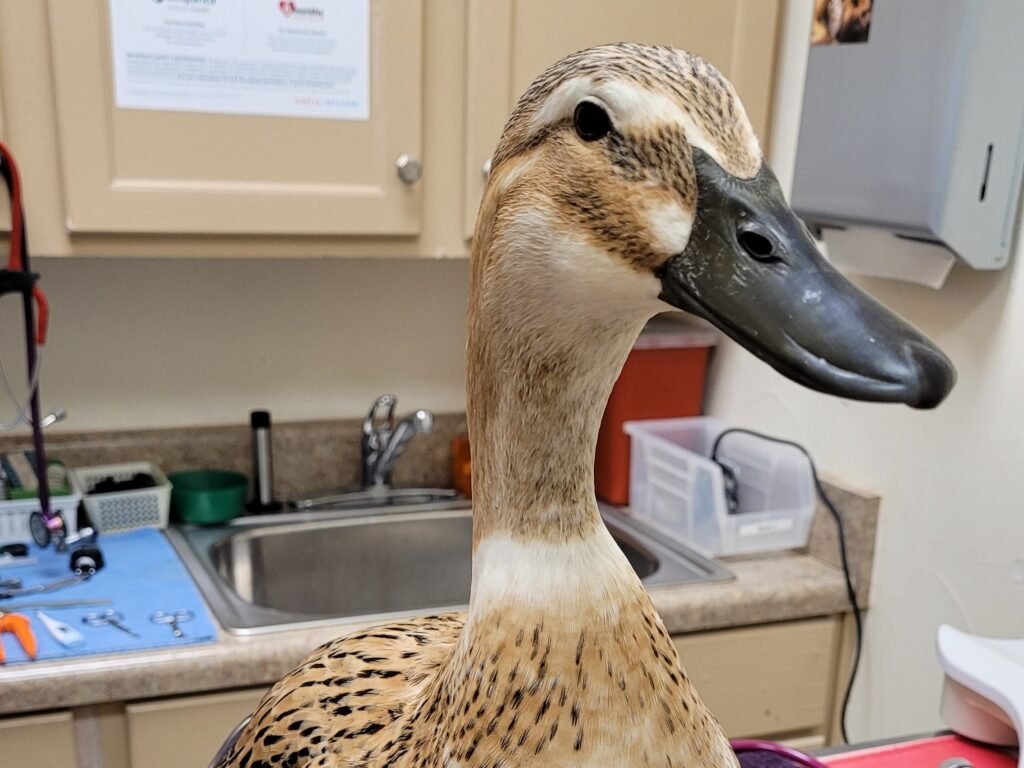
Breathe Easy: Keeping Your Ducks Healthy and Cough-Free
As a dedicated duck owner, ensuring your flock stays happy and healthy is always a top priority. Coughing or respiratory issues can be concerning, but with a keen eye and some preparation, you can quickly address mild symptoms before they turn into serious problems. From using VetRx to creating herbal remedies, these natural treatments can offer your ducks much-needed relief and support their recovery.
However, always remember that ducks are excellent at hiding illnesses, so it’s crucial to monitor them closely. If symptoms worsen or persist, don’t hesitate to consult a veterinarian for expert care. Your ducks will thank you with happy quacks and wagging tails once they’re feeling better!
By staying informed and prepared, you’ll be ready to tackle any health hiccups that come your ducks’ way. 🦆💚
FAQs
Q1: Can ducks get colds like humans?
Yes, ducks can catch colds, which may present with coughing, sneezing, and nasal discharge. However, what seems like a cold could also be a more serious respiratory infection.
Q2: How can I prevent respiratory infections in my ducks?
Regularly clean the coop, ensure proper ventilation, and avoid overcrowding. Providing a balanced diet also helps keep their immune systems strong.
Q3: Are there over-the-counter medications I can give my ducks?
It’s best not to administer human medications to ducks without veterinary guidance. Many over-the-counter medications can be harmful or ineffective for poultry.
Have any questions or other tried-and-true remedies you swear by? Let me know in the comments below—I’d love to hear your experiences!
Related Articles You May Find Interesting
- How to Conduct a Duck Health Check: A Comprehensive Guide
- Recognizing and Addressing Respiratory Conditions in Ducks
- The Duck Respiratory System: Airways, Lungs, and Air Sacs in Detail
- 16 Common Duck Health Conditions You Should Know About
- 31 Must-have Items for Your Pet Duck First Aid Kit
- 8 Internal Duck Parasites You Should Be Aware Of
- Aspergillosis in Ducks: Causes, Symptoms, Prevention, and Treatment
- Duck Virus Enteritis: How to Protect Your Flock from This Deadly Duck Disease






